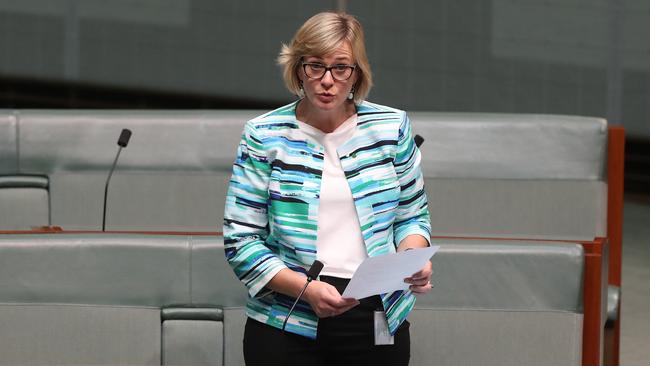
A sterling example of the new crossbench is self-declared moderate Zali Steggall. She is a politician so lightly in touch with the national interest that her maiden speech included the goal to decarbonise Australia. On the ABC she claimed Liberal moderate credentials, despite never having voted for the federal Liberal Party. And she has taken to outlandish historical revisionism by imagining Margaret Thatcher as a climate comrade in arms.
In her maiden speech, Steggall praised Thatcher as an example for conservatives to follow. She praised the Tory government’s ban on chlorofluorocarbons in the 1980s and drew on a line from Thatcher’s speech to the UN: “We carry common burdens, face common problems and must respond with common action.”
The Iron Lady featured in Steggall’s campaign materials, where the MP referred to a magazine that quoted Thatcher in 1990: “The danger of global warming is as yet unseen, but real enough for us to make changes and sacrifices, so that we do not live at the expense of future generations.”
Such quotes are compelling and have led to the mistaken belief that Thatcher would have supported the 21st-century left on climate change. By way of example, Steggall imagines that Thatcher accepted today’s science on climate change in 1990. How she managed to travel through time is one of the 46th parliament’s great mysteries.
By the turn of the century, Thatcher had become highly critical of climate change politics. Even by the early 1990s her scepticism was growing. In her 1993 book The Downing Street Years, she explained the influence of her early career in chemistry research on her approach to climate policy: “There had always to be a sound scientific base on which to build — and of course a clear estimation of the cost in terms of public expenditure and economic growth foregone — if one was not going to be thrust into the kind of ‘green socialism’ which the Left were eager to promote.”
Thatcher believed climate change solutions would arise from the wellspring of genius and fundamental science, neither of which could be planned because they were products of the “unique creativity of a particular mind”.
Such reasoning did not bode well for her membership of the emerging global green movement. She drew a distinction between her government’s ban on CFCs and the politics of global warming. While the cause and effect relationship between CFCs and ozone depletion was fairly linear and demonstrable, global warming was far more complex. As a result, she found the science less certain and reliable.
Thatcher was at pains to distinguish her beliefs about climate change from the socialist approach. The chief distinguishing feature was her belief that free societies, not governments, offered the best means to overcome the threats to individual and collective wellbeing posed by global environmental changes. She identified economic progress under capitalism, pure science and public debate as the foundations on which climate change mitigation would be built, where necessary. By contrast, socialists believe each discovery about climate change is a problem for which “the repression of human activity by the state” is the solution and state-planned production targets take precedence.
If we follow the advice of Steggall and take Thatcher’s most recent work as our starting point for a bipartisan approach to climate change, we would view the parliamentary left as an obstacle to progress. Consider Labor’s pre-election promise to impose new taxes for big state experiments, among them a 45 per cent greenhouse emissions target, a 50 per cent renewable energy target and the goal to make half of new cars electric by 2030. Independent economist Brian Fisher estimated that reducing emissions by 45 per cent by 2030 could result in a $53 billion hit to Australia’s GDP.
Despite begging the authority of Thatcher, Steggall has gone down the path of a command-and-control approach to environmental policy. In her Zali Steggall Policy on Climate and Energy, 2019, she calls for: the phasing out all coal-fired generation; preferential treatment under import tariffs, fringe benefits tax and luxury car taxes for electric vehicle manufacturers; more money to environmental groups; and investment in a non-governmental climate body with the power to set national renewable energy targets. Steggall anticipates this will require “sizeable” investment but reckons it would be “tiny compared to the $1.7 trillion Australian economy”.
Last week, she railed against the government for its commitment to reduce the national debt because she thinks climate change will produce the biggest debt “ever”. Like many politicians who go a bit berko about climate change, Steggall has stepped out on a limb to claim it represents “the greatest threat to our national security, our economy, our health and our environment”.
Thatcher warned about doomsday climate alarmists and their habit of sacrificing reason on the altar of ideology. In her 2002 book Statecraft, she took issue with Al Gore for his “apocalyptic hyperbole” and called former British MP cum climate alarmist Robin Cook a modern-day King Canute. The fact politicians could make such doomsday predictions unchallenged illustrated to Thatcher how thoroughly the governing classes were corrupted by “the new dogma about climate change”.
Thatcher was unimpressed by climate alarmism. She thought it shameful for politicians to make doomsday predictions to justify green interventions on the taxpayers’ purse. She believed in the power of individual genius, not the state, to mitigate whatever negative effects climate change might produce. Thatcher was the antithesis of modern doomsday prophets who declare the end of the world is nigh to make green tax grabs look like moral virtue.




The 46th parliament of Australia is conservative. The Liberal-Nationals Coalition, led by an evangelical Christian, was returned by the people with a majority. But several MPs are in a protracted state of denial about the election outcome. The crossbench is especially afflicted, so much so that independents who vote with Labor and the Greens are lecturing conservatives on the virtue of nonpartisan politics.